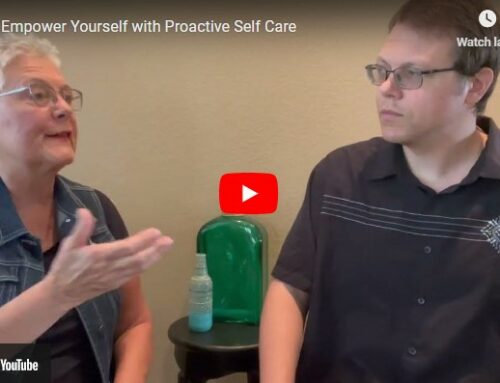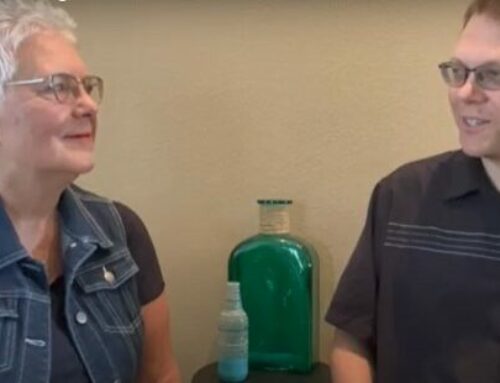Watch Part 1: How Integrative Care Can Benefit You
Watch Part 2: Empower Yourself with Proactive Self-Care
Transcript:
What does the first session of naturopathic care with a doctor look like?
Okay. The first session, we see them for about an hour. They come in with papers that they fill out so I can get a good history. It’s very important for me to interview the person. Their story, where they’re at, their perception of their health and healing, and everything they want to give me. The traumas that they’ve experienced. All of it. The physical, mental, emotional. It takes about an hour. And they–I ask a lot of questions. And they, in turn, ask me questions. And so that is–and of course I do a physical–and then, depending on what they need, their tests and stuff like that, we write scripts for testing and such. The second time they come in, we have all the tests, we have the history, and the physical, and all this together, and then we talk about the tests and the protocol. And from there I tell them to tell me the changes along the way so we can tweak things. We don’t just prescribe something and say, “see you in a year or two.” We want to see what the body–how the body is responding to the protocol so we can make the changes. So I always tell them, I’m with you on this journey, but you have to, you know, make some changes yourself and then we go into that–into what they’re responsible for. And when we feel like we’re in partnership on this journey, that’s when things really take off. Because it’s not just the doctor healing you, it’s, “I’m in this, and oh, I learned this, and Dr. Marcantel…” They come back and tell me what they learned and how they applied it and they get excited about it and they take off. And then–I’m very passionate about it because I see the empowerment within the individual. And that’s the reward.
So there are tests that are run with measurements and statistics–hard numbers that we can look at and we can measure. And not only do we take that, there is something beyond that where we also talk about the events in a person’s life. Things that are not measured in a lab. So, we take both of those together as one. Can we talk about some of the things that are not measured in a lab that we go over as part of the whole person?
Thank goodness for technology and all the labs that we can run. But, for instance, one of my tests that I have is divided into half. We have test results, specifically hormones from the saliva–that’s it, that’s the fact, right there. Those are objective results. And then the second half of the test is we take their symptoms. There are many symptoms on a scale of mild to severe and we graph that out. So, we can’t just look at the individual’s test result, and we can’t just look at the individual’s symptomology. We need to combine them. And this takes experience–I didn’t just learn this overnight–but the combination of both of them and their story is going to give me enough information to set up a protocol that I feel like will work for them.
What are we talking about when we say “protocol”?
Oh, okay, so like what I choose for them to be on, so like maybe certain supplements, or if they have a thyroid problem, hypothyroidism or something like that, we’ll give them medication if they need that, we’ll give them supplements, we’ll look at the stressors because stress is a big thing in today’s life, and if a person has had a history of, you know, some kind of trauma or abuse situation we have to add that into everything because it has affected their adrenal glands, which are very important in handling stress. So we have to look at–just everything. Each person that comes in is a different story. There is not “one size fits all.” And that continues as we progress towards their healing. It’s a continual change. So I really encourage them to check in with me. They can just do texts and that’s all I need and let’s just tweak this a little bit or tweak that and then they don’t have to keep coming in.
So it’s not one size fits all, there is a protocol for everyone and that’s part of this philosophy that everyone is a unique individual with their own unique needs and we sit down with an integrative doctor, find what those things are together and then empower the patient to help themselves. What types of things do people come to you with? What types of things are appropriate to see an integrative medicine doctor about?
Just about everything. I didn’t realize this when I graduated from medical school, but I really have an interest in endocrinology because the glands and the hormones they release are like the big players in the body. They affect all of our organ systems. They run through the blood from the gland, the hormones do, and affect all of our organ systems. So they’re kind of like–I call them the bandleaders. So I start there when people come in–unless it’s a gut issue or something like that, a lot of people come in with that–you know, then you look at let’s check their food. Food sensitivity testing, stuff like that. So I kind of like to go to, once again, the big guys, the ones that are in charge of the root cause. And from what I see, hormones play a–and I’m talking about all hormones, not just estrogen, progesterone, testosterone; I’m talking about the stress hormones, you know, adrenaline, cortisol, the thyroid, and all that–plays so much importance in the body. So I like to look at that, I like to look at the gut. And there’s a lot of counseling involved in what I do because people are in stress right now. They’re in their sympathetic nervous system, and it’s hard for them to hear things when they’re there. So one of the first things we do when they come in is provide a calming atmosphere. I’m very aware of the calming atmosphere that I provide for people because it will help people to relax, get into their parasympathetic nervous system, and receive. Because that’s what it’s about. When you’re relaxed and you start trusting the doc you can start receiving just a little bit better. It’s a process and a progression, you know, of trust. And so people come in for all kinds of different things. But, again, I like to go to some of the systems that are responsible for the whole body and for the root cause.
So have you ever come into a case where it is difficult to work with a patient or it is difficult to help solve something with your patients? How do you and your patients work together to get through that?
Yes. It can be very challenging for some, especially those that have been through trauma. We have to deal with those aspects as we’re going along. So the first thing I do is–people don’t feel good when they’re coming in. So I take care of the physical first, because, you know, people have trouble receiving when they’re not feeling good or they’re in pain, or whatever, or they’re not sleeping. The challenging part is usually the mental/emotional aspects that we have to work through. And as people are starting to lighten up–and thank goodness we have referrals; there are counselors out there, there are psychiatrists, and such, that we work with–but I would say the challenge is mostly getting through some tough things that people have been through in order to receive what I have to offer them. And a lot of times, we’re their last stop.
Their last stop?
Yeah, as far as for, you know…they’ve been through a lot of doctors and stuff, and so…I don’t feel comfortable when people tell me this, but I’m getting used to it, is, “You’re the last one that I’m coming to that I…” You know, say this, and that doesn’t make me feel comfortable because I always say, you know, hey I’m not playing God here–this is going to be both of us together.
So what are some resources that people can investigate on their own–we had talked about the Internet and people doing their own research–what sort of sources would you recommend to people who are interested in taking care of themselves and looking into this kind of care?
Well, they can go to the websites of different doctors and see what they offer. Just go to the websites, start there. Because a lot of doctors have what they do and what their approach is. So just start there. There’s a lot of other places you can go, of course–PubMed, Mayo Clinic, and all that–but just be careful because sometimes we try to self-diagnose and then, I call it “Doctor Google” gives us a little too much information that makes us anxious. Look, explore, take time to look at the different physicians in your area. Know yourself and who you resonate with. There’s a lot of great doctors out there, both conventional and naturopathic. I say it’s an integrative outlook. It should be everybody working together.
Everybody working together. I think that’s an excellent summation of what integrative care is all about. Thank you so much for joining me today, this has been wonderfully educational. And thank you for joining us, as well.
Thank you.





